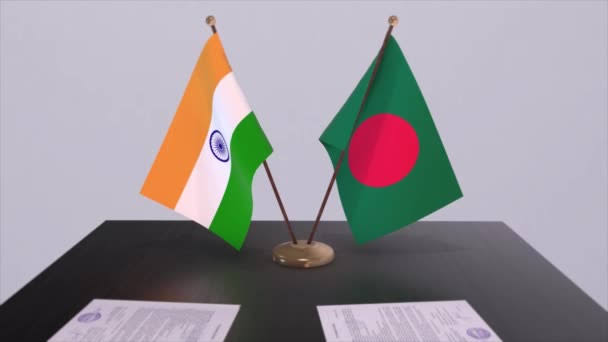Syful Islam
Published:2025-07-26 14:59:06 BdST
Trade disputes mount as meet skipped for three yearsDelhi ignores Dhaka's request for trade talks, businesses pay
India continues to cold-shoulder requests for holding talks to resolve accumulating trade-related disputes, officials say, while Bangladesh businesses have to pay for abrupt shipment restrictions in particular.
In recent months, calls from Dhaka went unheeded for lifting the ban on trade carriage through land ports, holding bilateral commerce secretary-level meeting, and meeting of joint working group on trade, among others.
Sources guess political implications for the bilateral economic relations of late. Officials say after the August 2024 student-mass uprising, which ousted former Prime Minister Sheikh Hasina, forcing her to take refuge in New Delhi, the government of India turned taciturn on any letters sent from Bangladesh on bilateral trade issues.
They mention that India, on May 17, imposed port restrictions on the import of certain goods, including apparel and processed foods, from Bangladesh.
Also put on the prohibitive list are fruit and fruit-flavoured and carbonated drinks, processed food items, cotton and cotton-yarn wastes, plastic and PVC finished goods, except pigments, dyes, and wooden furniture which can be imported through any land customs stations (LCS) or integrated check-posts in Assam, Meghalaya, Tripura and Mizoram, and LCS in Changrabandha and Fulbari in West Bengal.
Following the unilateral trade taboos, Commerce Adviser of the incumbent interim government Sk Bashir Uddin on May 29 wrote to Indian Minister of Commerce and Industry Piyush Vedprakash Goyal requesting suspension of the port restrictions.
However, officials say, nearly two months have passed by sine but Dhaka has yet to receive any response from New Delhi, about the letter sent by the adviser.
Instead, India on June 27 also banned import of jute and allied fibre/products from Bangladesh by all its land-ports and seaports, save the far-off Nhava Sheva seaport in Mumbai.
The land-haulage sealing has a huge trade cost--Bangladeshi jute millers and exporters say the cost of transportation of cargo per tonne increased by $100, making the item uncompetitive.
Now they need to send jute and jute goods by sea from Chittagong seaport to Nhava Sheva Port in Maharashtra in the West Coast of India from where goods are transported to Kolkata by road in a distant detour, as most Indian jute mills are located in that area that is close by Bangladesh.
Earlier, India in April revoked the transshipment facility for Bangladeshi goods export to third countries using its airports. This taboo also hiked cost of Bangladeshi exports, especially, apparel exports, as airshipment of cargoes is costly in Dhaka than in Delhi.
Officials say trade-related disputes can be remedied by discussing in bilateral commerce secretary-level meeting, and meeting of the joint working group on trade.
However, these meetings are also not taking place for years for lake of response from the other side.
Last time the commerce secretary-level meeting held was on March 4, 2022 in New Delhi. The subsequent meet was supposed to be held in Dhaka in 2023. On January 24, 2023, Bangladesh proposed three sets of dates, between 15 March and 15 April 2023, to India for holding the meeting in convenient time.
However, the proposal was not reciprocated although two and a half months have elapsed.
As time passed by and problems kept piling up, the commerce ministry over again dispatched on May 12, 2025 proposal for secretary-level meeting in the first or second week of September 2025, but to no avail yet.
Moreover, after the land0port restriction imposed on May 17, 2025, Bangladesh immediately requested India to hold commerce secretary-level meeting and meeting of the joint working group on trade in late June or mid July--either in person in Dhaka or on virtual platform.
"All the repeated requests went in vain," says one official in the know.
The commerce adviser in his letter, sent on May 29, also had requested secretary- level meeting immediately, but to no response.
In another standoff, officials say, the operation of Bangladesh-India border haats (markets) remained suspended since August 2024 following the regime change. If a commerce secretary-level meeting can be held soon, discussion can be held on the border haats for making them operational again.
Also, the steps for advancing discussion on the most-talked-about Comprehensive Economic Partnership Agreement (CEPA) between Bangladesh and India remained on hold since February last year.
Commerce officials here mention that the heads of government of Bangladesh and India in a meeting in September 2022 had decided to begin formal negotiation for signing CEPA as early as possible.
The two sides in February 2024 had exchanged trade data aiming to begin formal negotiation. However, since then, the issues remained on hold or did not see any progress.
"We are not getting any response from the Indian side despite repeated requests sent," says a senior official at the ministry of commerce.
According to officials concerned, a trade diplomat of the Indian High Commission in Dhaka met a joint secretary of the ministry of commerce last week.
However, while discussing the pending issues, the Indian official could not give any hope for holding bilateral commerce secretary-level meeting any time soon.
Dr Khondaker Golam Moazzem, Research Director at the Centre for Policy Dialogue (CPD), thinks India has political angle in case of any relationship with Bangladesh.
"India does not see the bilateral issues only in commercial aspects. It sees the issues from political perspectives," he said Thursday.
He said after the regime change last year, India said they would only go for discussion after an elected government takes office. "I think they did not change that position until now."
The economist adds: "Since Bangladesh has trade interests with India, Dhaka now can keep Delhi informed about the developments so that if talks begin in the future, they can use these as references.
Unauthorized use or reproduction of The Finance Today content for commercial purposes is strictly prohibited.


